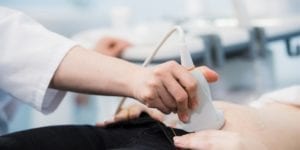 “Alexis” was stunned.
“Alexis” was stunned.
She was about six weeks pregnant, undergoing an ultrasound at Charlotte, North Carolina’s busiest abortion facility, A Preferred Women’s Health Center, when the ultrasound technician nonchalantly uttered a word that would change her entire course:
“Oh—twins.”
Alexis wasn’t shown the ultrasound, but the impact of those words was enough. She’d always wanted twins. As her mind tried to sort through her emotions and this new piece of information, she was given the first drug in the chemical abortion regimen and handed the second to take within 48 hours.
She was still in a daze as she left the abortion facility. But then, something broke through: The words of a sidewalk counselor outside of the clinic doors.
“It might not be too late for you — AbortionPillReversal.com — they can still help you save your baby,” she said.
As Alexis drove away, she pulled into the nearest parking lot and did a search on her phone. She found the website the counselor had mentioned and called the helpline (877-558-0333).
“We got her started on the abortion pill reversal treatment extremely fast,” said Courtney Parks, abortion pill reversal coordinator for HELP Pregnancy Center. “It was a matter of hours.”
With abortion pill reversal, time is crucial.
Otherwise known as the “abortion pill” or RU-486, chemical abortions involve two drugs: mifepristone and misoprostol. Mifepristone, the first pill, destabilizes a pregnancy by blocking progesterone, the natural hormone needed to sustain a healthy pregnancy. To finish the abortion, misoprostol induces labor, forcing a woman’s body to deliver the baby.
To save the baby’s life, the abortion pill reversal treatment was developed by HELP medical director Matt Harrison and California physician George Delgado more than a decade ago. It works by giving a woman extra progesterone up to 72 hours after she takes the first chemical abortion pill.
Fortunately, Alexis reached out to the helpline early in that window.
Beautiful, little heartbeats
At her appointment, Parks and HELP’s sonographer, Kelly Byrum, were able to provide Alexis with what the abortion facility did not: The chance to view her twins on ultrasound.
“They were tiny, little babies and they had beautiful, little heartbeats,” said Parks. “I just remember sitting with her in that ultrasound room and her crying, and just hoping that this would work for her so that she could save her babies.”
Parks provided follow-up ultrasound scans for Alexis over the next several weeks, ensuring that her babies were still healthy and thriving.
To the joy of Alexis and her new support system at HELP, the protocol worked. After about a month, the center was able to connect her with a doctor who provided her with prenatal care for the rest of her pregnancy.
During that time, Parks and the rest of the HELP team kept in touch with Alexis, even throwing her a baby shower with a partnering ministry.
“She was overwhelmed with the amount of things she got,” Parks said, noting that Alexis now has her own little “baby store” of wipes and diapers if she runs out.
“She has had everything that these babies need for several years provided for her,” Parks said. “She told me, ‘If I had known what I know now and I had seen how the Lord has provided for these babies, I would have never even walked into that clinic.’ So she’s just been overwhelmed with just how good God has provided for her throughout this.”
After an otherwise uneventful pregnancy, Alexis delivered her twins early this year. Parks says that Alexis is thriving as a single mother, and even has the support of her own mother who moved in with her to help with the twins.
Alexis’s twins are two of the 750 babies who have been saved by abortion pill reversal. Parks, one of 800 clinicians within the Abortion Pill Rescue Network of providers, is hopeful that Alexis’s story can play a role in rescuing more families from the pain of abortion.
Reprinted with permission from PregnancyHelpNews.com. Katie Franklin is a writer for Heartbeat International. She previously served as director of communications for Ohio Right to Life and is a graduate of Denison University where she earned a B.A. in history in 2013. Katie lives in Columbus, Ohio with her husband Miles and their daughter.

Comments